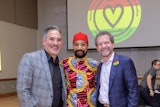WASHINGTON – For many young adults, Rev. Jesse Jackson Sr.’s historic 1984 bid for the White House may or may not be something they learned about in school. And while they have been taught to revere the Rev. Martin Luther King Jr., the civil rights movement’s most iconic hero, President Obama is to them the person who has broken the greatest political barriers.
But as a group of supporters, educators and political observers gathered at a Monday morning forum to celebrate Jackson’s legacy on the campus of Georgetown University observed several times, without Jackson in 1984, there would not have been an Obama in 2004. The event was hosted by sociology professor Michael Eric Dyson and featured remarks by Rev. Al Sharpton, Rev. Marcia Dyson, Lehigh University’s Dr. James Peterson, and Gary Flowers, who heads the Executive Leadership Forum.
“People often look at the results instead of the people who made them possible,” said the Rev. Al Sharpton, who delivered an impassioned speech about Jackson’s influence on his own political awakening and how the civil rights leader fought to level the playing field for African-Americans and other minorities in a variety of areas outside of politics, from main street to Wall Street.
According to Sharpton, a lot of effort was required to maintain hard-won victories, such as the Voting Rights Act, the Civil Rights Act, fair housing laws and other legislation that King and others had fought so hard—and, in some cases, lost their lives—for. There was always a chance, he said, that lawmakers might try to reverse those decisions but didn’t because people like Jackson backed them down.
Before Jackson made the decision to run for president, he tried to get people such as former Atlanta Mayor Andrew Young and Detroit Mayor Coleman Young to make the bid for the White House. But when they declined, he decided to run for office himself, angering others because he did what they wouldn’t.
Sharpton also hailed Jackson for founding the Rainbow-PUSH Coalition.
“That sounds easy in 2011, but in 1984-88, it was heresy to Black preachers to have a coalition with gays and lesbians and unthinkable to White progressives that Blacks were going to sit at the table and decide what the left’s strategy was going to be,” Sharpton said.
“We were supposed to pass out the fliers and go to jail while they made the decisions,” he continued, adding that, thanks to Jackson’s efforts, African-Americans and others were able to participate fully in the political process.
Jackson, when it was his turn to speak, said that his biggest priority has been to remain current and sow seeds that might blossom in ways that would move minority communities forward. Despite all the progress achieved, however, they are in many ways still very unequal, and he used sports metaphors to make his point.
Jackson said there’s a reason that Blacks have been able to excel in sports.
“First, you can’t inherit points. Second, the playing field is even. The rules are public, the goals are clear, the referee is fair and not [on the owner’s payroll]. The score is transparent,” Jackson said. “Beyond the playing field, the rules aren’t public, the goals aren’t clear and the score is not transparent. We’re not equal.”
Jeff Johnson, political activist and senior correspondent for theGrio.com, deeply admires Jackson but cautioned that, while it is important to have charismatic individuals who can provide a vision and motivate people, it is perhaps more important to develop a training infrastructure that supports young local activists and organizations that are already doing good work and helps them build capacity through data, research and training.
Johnson added that Jackson and other leaders have built organizations that enable them to provide the support to produce “more and more young soldiers that are prepared in their own way at the local level to do the very thing that Rev. Jackson did before anybody knew the name Rev. Jesse Jackson.”















